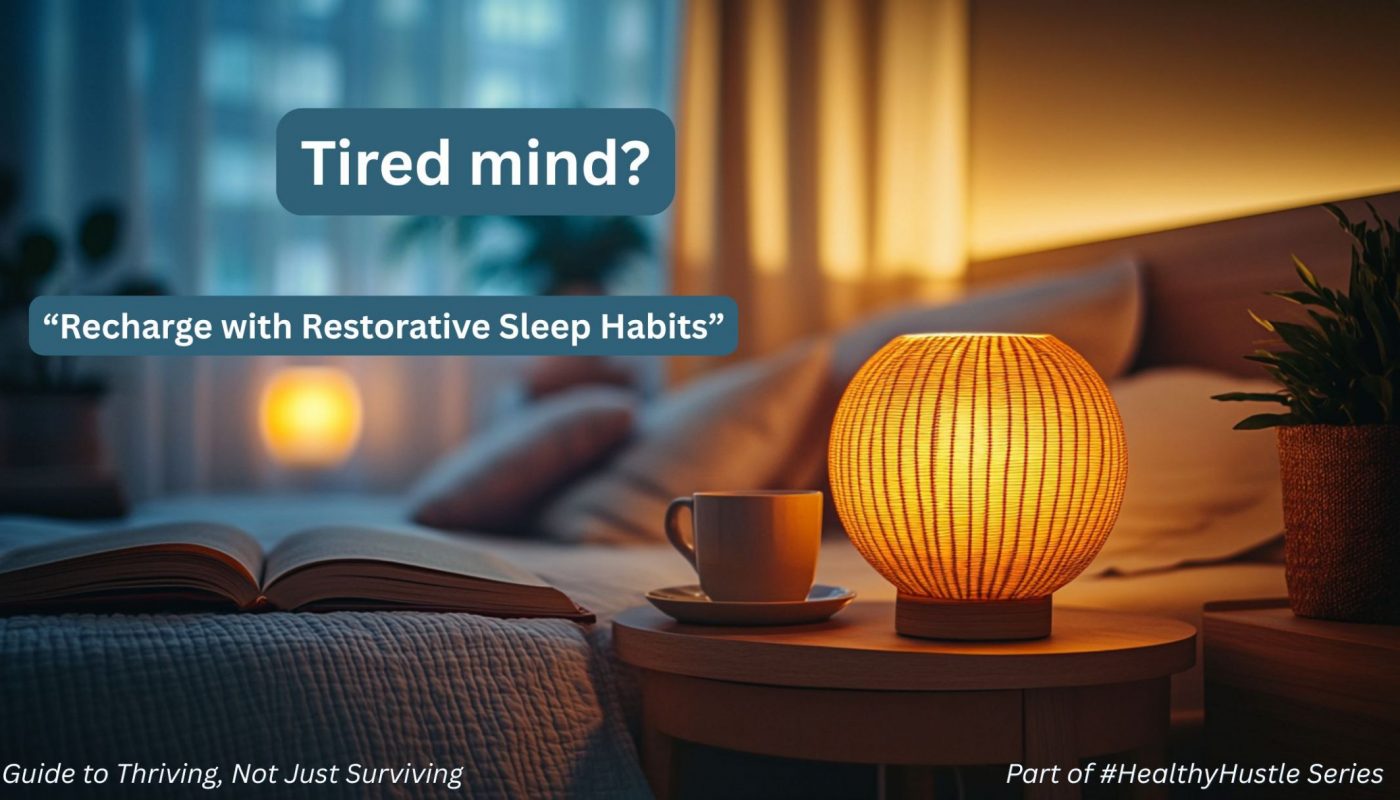Part of the “Healthy Hustle: Guide to Thriving, Not Just Surviving – Inspired by WHO Guidelines” Series
In my early twenties, sleep was an afterthought. Driven by a fear of missing out (FOMO), I treated nights as extensions of the day – juggling social events, studies, and endless scrolling. Back then, sleep felt like wasted time.
Now, I see things differently. Sleep isn’t lost time – it’s a vital investment in health and productivity. Prioritizing rest has sharpened my focus, stabilized my mood, and enhanced my overall well-being.
“Sleep is essential for physical and mental well-being. Inadequate sleep is linked to obesity, poorer mental health, and long-term health risks.”
– WHO Guidelines on Physical Activity, Sedentary Behaviour, and Sleep
The Science Behind Shuteye
There’s more going on during sleep than meets the (closed) eye. While the full science is still unfolding, here are a few key reasons why sleep is one of your most powerful performance boosters:
-
Memory & Focus Boost
When we sleep, our brain gets to work organizing everything we’ve taken in during the day. According to a study in Neuron, deep sleep strengthens memories and helps us absorb new information faster – essential if you’re juggling meetings, deadlines, or studies.
Source: Neuron – The Reorganization of Memory During Sleep -
Muscle Recovery Happens at Night
Your brain isn’t the only thing recharging. A study in Sleep Health shows that growth hormones peak during deep sleep – meaning your body repairs, rebuilds, and strengthens itself while you rest. No quality sleep, no quality recovery.
Source: Sleep Health – The Role of Sleep in Recovery Following Exercise -
Night Shift for Your Brain’s Cleaning Crew
One of the coolest discoveries in recent years: our brain clears out waste while we sleep. Research published in Nature Communications found that the so-called glymphatic system becomes highly active at night, flushing out toxins like beta-amyloid – a protein linked to Alzheimer’s.
Source: PMC – The Glymphatic System: A Beginner’s Guide
So next time you’re tempted to push through “just one more thing”, remember that sleep isn’t a break from productivity – it’s what fuels it.
Evening Rituals for Restorative Sleep
Over the years through books, podcasts and experimentation, I’ve adopted several habits that have significantly improved my sleep quality:
- Smart Lighting: Utilizing a smart lamp that simulates natural sunrise and sunset cues helps regulate my circadian rhythm, making it easier to fall asleep and wake up naturally.
- Caffeine Curfew: Avoiding caffeine after 5 p.m. prevents its stimulating effects from interfering with my sleep.
- Digital Detox: Steering clear of screens at least an hour before bed reduces exposure to blue light, which can disrupt melatonin production. When unavoidable, activating ‘eye-saver’ mode minimizes blue light emission.
- Reading Routine: Engaging with a book before bed serves as a calming ritual, signaling to my body that it’s time to wind down.
- Consistent Schedule: Going to bed and waking up at the same time daily reinforces my body’s sleep-wake cycle.
Track Your Sleep: A 7-Day Challenge
Understanding your sleep patterns can be transformative. Here’s a simple exercise to help you monitor and improve your sleep over the next week:
Feel free to copy the following list into your mobile notes. Every morning take 5 minutes to briefly reflect upon you sleep:
- Date: __________
- Bedtime: __________
- Wake-up Time: __________
- Total Sleep Hours: __________
- Sleep Quality (1-5): __________
- Caffeine After 5 p.m.? (Yes/No): __________
- Screen Time Before Bed? (Yes/No): __________
- Notes (e.g., dreams, disturbances): __________
Repeat this for seven consecutive days. At the end of the week, review your entries:
- Do you notice patterns between your habits and sleep quality?
- What adjustments can enhance your rest?
Join the Conversation
What are your go-to strategies for ensuring a good night’s sleep? Share your tips and experiences in the comments below.
Continue Your Wellness Journey
Optimizing sleep is a cornerstone of health, but it’s just one piece of the puzzle. Explore the previous posts to further enhance your well-being:
- Post 1: Step Up Your Day – Incorporate simple movements into your routine to boost energy and focus.
- Post 2: Mindfulness Break: Reset Your Focus in 1 Minute – Discover quick mindfulness techniques to alleviate stress.
- Post 3: Smart Nutrition Choices: Fuel Your Workday – Learn about nutritious options to sustain energy throughout the day.
Hashtags: #HealthyHustle #SleepOptimization #RestAndRecharge #MindfulRecovery #CircadianHealth #WHORecommendations #WorkdayWellness #ThrivingNotSurviving




